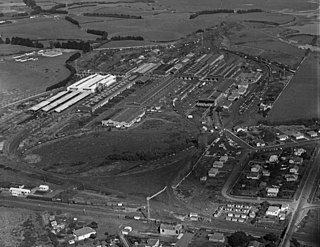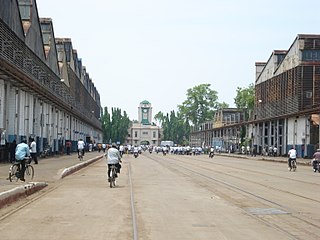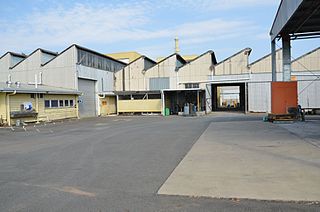
The Derby Works comprised a number of British manufacturing facilities designing and building locomotives and rolling stock in Derby, England. The first of these was a group of three maintenance sheds opened around 1840 behind Derby station. This developed into a manufacturing facility called the Midland Railway Locomotive Works, known locally as "the loco" and in 1873 manufacturing was split into locomotive and rolling stock manufacture, with rolling stock work transferred to a new facility, Derby Carriage & Wagon Works.

Doncaster Railway Works is a railway workshop located in Doncaster, England.
The Indian Railway Service of Mechanical Engineering, abbreviated as IRSME, is one of the group 'A' central engineering services of the Indian railways. The officers of this service are responsible for managing the Mechanical Engineering Division of the Indian Railways. Till 2019, IRSME officers were drawn from the Combined Engineering Service Examination (ESE) and Special Class Railway Apprentice (SCRA) examination conducted by Union Public Service Commission. All appointments to the Group 'A' services are made by the president of India.

Jamalpur Locomotive Workshop is a railway workshop established on February 8, 1862, as the first fully-fledged railway workshop facility in India. It was started by the East Indian Railway Company (EIR) as a result of the so-called "Railway Age" in India, which began in 1854.
The London Transport Executive was the organisation responsible for public transport in Greater London, England between 1948 and 1962. In common with all London transport authorities from 1933 to 2000, the public name and operational brand of the organisation was London Transport.
The history of rail transport in Great Britain 1948–1994 covers the period when the British railway system was nationalised under the name of 'British Railways', latterly known as British Rail until its eventual privatisation in 1994.
The East Town Railway Workshops were a major manufacturing, maintenance and repair facility of the New Zealand Railways Department (NZR) located by the Marton - New Plymouth Line in the city of Wanganui in New Zealand's North Island. Output included not only rolling stock but also tools, equipment, huts, furniture and tarpaulins. It was a prodigious facility, and one of the larger employers in the city. Its name is sometimes formatted as Eastown or Easttown.

Otahuhu Railway Workshops were a major rolling stock construction, maintenance and repair facility operated by the New Zealand Railways Department (NZR), in the south Auckland suburb of Ōtāhuhu in New Zealand's North Island. The workshops were opened in 1928 and were closed in 1992 as part of a rationalisation of workshop facilities throughout the country.
The Hutt Railway Workshops is a major railway engineering facility in the Lower Hutt suburb of Gracefield in the Wellington region of New Zealand's North Island. It is state-owned enterprise KiwiRail's only workshops, and was opened in 1930.
The Petone Workshops were a government-owned railways maintenance and repair facility located in Petone, in Lower Hutt in the Wellington region of New Zealand's North Island. It took over construction and maintenance of rolling stock in the Wellington region from the Pipitea Point facility, starting in 1876, and became the only such facility in the region from 1878 until the opening of the replacement Hutt Workshops facility in 1929.

The Cardiff Locomotive Workshops is a rail yard and rolling stock facility located between Cockle Creek and Cardiff stations near Newcastle, on the Main North railway line in New South Wales, Australia.

The Golden Rock Railway Workshop, in Ponmalai, Tiruchirappalli, Tamil Nadu, is one of three railway workshops serving Indian Railways' Southern Railway zone. The workshop is part of the railways' Mechanical Department. The other two Southern Railway workshops are in Perambur, Chennai.
Carriage Repair Workshop based at Lower Parel in the city of Mumbai, India is a premier Broad gauge coaching workshop of Central Railway, India. The workshop undertakes the periodic overhauling of passenger main line coaches. It also manufactures wheel sets for the workshop as well as various Locomotives in Mumbai.
The Kanchrapara Railway Workshop is one of the major workshops of Indian Railways, and is located in the Sealdah division of the Eastern Railway zone. It is divided into two complexes — Loco Complex and Carriage Complex. It caters to the major overhauling of a large product mix of IR, including locomotives, ICF Coaches, EMUs, MEMUs, DEMUs, Tower Cars, etc. Its mention can be found in Satyajit Ray's short story "Patol Babu Superstar", which was also included in the Class 10 English Communicative Curriculum of the CBSE.

The Eveleigh Railway Workshops is a heritage-listed former New South Wales Government Railways yards and railway workshops and now venue hire, public housing and technology park located at Great Southern and Western railway, Redfern, City of Sydney, New South Wales, Australia. It was designed by George Cowdery and built from 1882 to 1897 by George Fishburn. It is also known as Eveleigh Railway Yards, South Eveleigh Precinct; North Eveleigh; Macdonaldtown Gasworks; Macdonaldtown Triangle and also by the name of its current occupants, Carriageworks. The property is owned by the Transport Asset Holding Entity, an agency of the Government of New South Wales. It was added to the New South Wales State Heritage Register on 2 April 1999. The workshops are considered to have world heritage significance by curators of the Smithsonian Institution.
Chullora Railway Workshops were a major workshops for the repair and heavy maintenance of locomotives and rolling stock for the New South Wales Government Railways.

North Ipswich Railway Workshops is a heritage-listed former Australian railway workshop at North Street, North Ipswich, Queensland. It was built from 1878 to 1980s. It is also known as the Workshops Rail Museum. It was added to the Queensland Heritage Register on 21 April 1997.

Rockhampton Railway Workshops is a heritage-listed railway workshop at 380 Bolsover Street, Depot Hill, Rockhampton Region, Queensland, Australia. It was built from 1915 to 1953. It is also known as Rockhampton Roundhouse. It was added to the Queensland Heritage Register on 21 August 1992.

Società Nazionale Officine di Savigliano (SNOS), also known as Savigliano, was one of the most prestigious Italian industrial companies of the twentieth century. It had interests in many sectors including mechanical and electrical engineering. It was founded in Turin on 17 July 1880, with a share capital of one million lire, with the aim of undertaking the "construction and repair of railway material, metal bridges, canopies, mechanical, electrical and aeronautical constructions as well as woodworking. generally".

The Eveleigh Chief Mechanical Engineers office is a heritage-listed former engineer's office and now unused building located at Main Suburban railway line in the inner western Sydney suburb of Redfern in the City of Sydney local government area of New South Wales, Australia. The building fronts 505 Wilson Street, opposite Shepherds Lane, Eveleigh. It was built in 1887. It is also known as Eveleigh Chief Mechanical Engineers office and movable relics and Sydney Technology Park. The property is owned by Transport for NSW, an agency of the Government of New South Wales. It was added to the New South Wales State Heritage Register on 2 April 1999.










